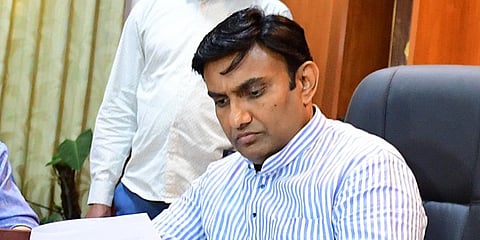

BENGALURU: With 2020 putting a tremendous pressure on the healthcare system because of the Covid pandemic -- unprecedented for this generation -- Health and Medical Education Minister Dr K Sudhakar has one major item on his wish-list for the next year: That Chief Minister BS Yediyurappa present a “revolutionary health budget” in 2021.The Covid-19 pandemic tested the medical fraternity to its limit and in many areas, the infrastructure was found wanting for the population to avail medical facilities easily.
Considering this, the Health Minister, during his exclusive interaction with The New Indian Express on Thursday, said, “Chief Minister Yediyurappa is committed and wants to ensure Karnataka will be the best state in terms of providing healthcare to citizens. I hope for a revolutionary health budget in 2021.”
Over the last three years, the health budget in the state has never crossed 4 percent of the total allocation. In 2017-2018, it was even lesser, at 3 percent. In 2020-21, Rs 10,296 crore was allocated for the health and family welfare sector with a budget provision of 2,846 crore, of which Rs 1,433 crore was for urban healthcare services and Rs 1,413 crore for the rural sector.
Dr Edmond Fernandes, CEO, Centre for Health and Development, headquartered in Mangaluru, said, “The next budget must focus on putting public health at the heart of development. District health offices must invest in epidemiologists and community medicine physicians. Addressing cascading risks are equally crucial with pandemics, climate change, natural disasters etc. The government has been doing good work, but affordable healthcare is a dream we must realise in our lifetime.”
HEALTHCARE MANPOWER
On how they will deal with a second wave, if there is one, Dr Sudhakar said they are increasing human resources in Primary Health Centres, Community Health Centres and government hospitals. In the last six months, 1,000 postgraduate medical students have been enrolled for compulsory government health service. “1,500 more healthcare workers will be enrolled in the health department, apart from 2,500 doctors who will also be recruited. We will not have problems with human resources next year,” he said.
VACCINATORS
Dr Sudhakar said one lakh people have been recruited to be vaccinators in rural and urban areas to administer the upcoming Covid-19 vaccine. “30,000 facilities have been identified to store the corona vaccine. We need 25 to 30 walk-in refrigerators and walk-in freezers and already have 10-12. The remaining will either be built by the state or sent by the Centre. We have worked out logistics of delivering the vaccine and are also holding discussions with private companies. We are in the right direction and preparation is on for the last two to three months,” he said.
VACCINE PERFORMANCE
He opined that the vaccine will be capable of handling any strain of virus, in light of the Covid variant found in the UK. The vaccine will likely need two doses, with the booster dose 21 to 28 days after the first one. This works in increasing immunity and generation of antibodies, which will be valid for six to 12 months, depending on the vaccine. Just as what is seen with influenza and flu vaccines, Covid shots too may have to be taken yearly, he said, adding that virus mutations are expected.
Inoculation NOT MANDATORY
“No vaccine can be made mandatory, but this one I presume, will be taken by most people. The government won’t deny the vaccine to anyone nor force it on anyone. We have not decided if we will charge people for it. However, till date, every facet of Covid care, right from testing to treatment, has been provided free to people under the government quota,” he said, adding that the Central Government will procure the vaccines and send them to all states. In the first wave of the pandemic, government health infrastructure was plagued with manpower shortage, he admitted.